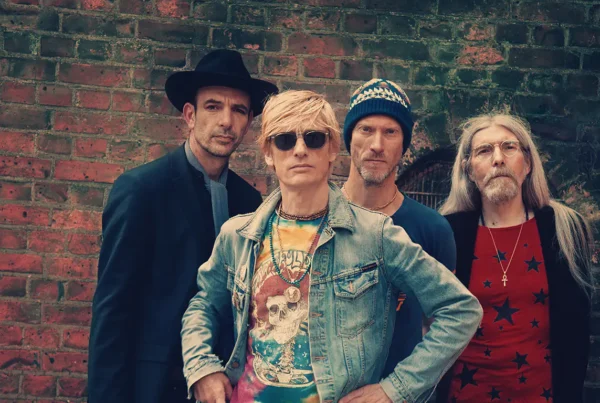Words: Callie Petch
London can be an intimidating place, especially if you’ve never lived in any city before. Huge huddled masses of people, usually in the several hundreds, are a constant, especially in the populous bustling city centre where you’ll inevitably be spending much of your time. Tube layouts are just a mess. Traffic is ever-present and it seems to take forever for the lights to change. Plus, shit is expensive, try to get a can of Diet Coke in the wrong venue and what usually goes for 80p will set you back an eyewatering £3. Compounding that intimidation, I’m sure that, from the outside, a film festival seems impossibly glitzy and elitist, particularly if one wants to be a member of the press. It’s only when you step inside that one discovers it’s actually a barely on-rails all-consuming whirlwind of a thing which happens to you and so must let it all wash over lest you end up drowning. The London Film Festival can be a lot.
Fortunately, it’s not something you have to do entirely by yourself. Despite the reputation they may have developed in social stereotypes, perverted by Online Discourse platforms being what they are, film critics are actually perfectly normal people who just like a chat. In my years of coming here, I’ve been fortunate enough not to stumble across any real snobs or argumentative arseholes when trying to start up chats and even the most name or intimidating folk have actually been lovely and welcoming to an outsider such as myself when the convo ball gets rolling. There’s probably also just a general sense of camaraderie and shared understanding for those in the festival churn. The late nights, even earlier mornings, quick turnarounds, barrage of often slow-paced character dramas not conducive to said schedule, and inescapable fact that nobody can see everything they want to seem to bond most of us together in solidarity to a degree which makes things welcoming for vet and newbie alike. Also, that nothing unites people faster than introverted passive-aggression at queue-jumpers.
Sometimes, these groups form naturally; a result of seeing the same few people in the queues, in the screens, and in the post-film huddle scrum which leads to hitting it off if only to break the ice. Sometimes, these groups form from an initial plan; online friends who’d never seen each other in real life arranging to meet in-person at long last and revel in each other’s company before geography and life splits up the fun. And sometimes, these groups can form artificially; put together as a result of a scheme or programme so eight strangers who might normally have nothing to do with each other end up pushed into that orbit and the mayhem of the festival bonds them all that way. The last one is how a lot of my first week down here has gone, being a part of the BFI Critics Mentorship programme, which is why I haven’t had a whole lotta time to write yet. It has been very fun, though, especially since everyone on the course is a lovely person.
I’ll probably write more about my time on the course in future dispatches, but my point with this intro specifically was to bring up the fact that making social connections at a film festival isn’t all that hard. (And I can say that since I have a crippling anxiety problem which makes socialising with people I don’t know the absolute pits.) When you do, a lot of the intimidation factor surrounding the Festival wafts away harmlessly and you relax somewhat. I’d also argue it helps make you a better critic, since you end up talking with other critics about what you’ve just watched and such debate takes one out of their head to work through their feelings on a film in real time. Sometimes, doing so can even help you realise things about a movie you hadn’t when watching, although that might not always be in the movie’s best interest.
 A prime example of such a 180 would be for Red Rocket (Grade: C+), the latest work from Sean Baker of Tangerine, a transgender sex worker farce-until-it’s-not, and The Florida Project, a humanistic look at life on the Floridian poverty line. See, Red Rocket plays a very cruel trick on the viewer. Baker’s prior films established him as a director with an uncommonly empathetic knack for telling the stories of American Capitalism’s underprivileged. In particular, and in his own words, he has devoted his career to “tell[ing] stories that remove stigma and normalize lifestyles” of sex workers as fully-dimensional dignified people with agency in what they do. In his production design and cinematography, he utilises digital film plus smart post-production VFX, such as adjusting the contrast of certain shots or upping the saturation in the colour-grading, to walk a fine line in making these low-income near-abandoned communities look real without overdoing the grime and descending into poverty porn. He finds the humour, the heart, and the humanity in those whom the film industry and society at large either demean or simply choose to ignore.
A prime example of such a 180 would be for Red Rocket (Grade: C+), the latest work from Sean Baker of Tangerine, a transgender sex worker farce-until-it’s-not, and The Florida Project, a humanistic look at life on the Floridian poverty line. See, Red Rocket plays a very cruel trick on the viewer. Baker’s prior films established him as a director with an uncommonly empathetic knack for telling the stories of American Capitalism’s underprivileged. In particular, and in his own words, he has devoted his career to “tell[ing] stories that remove stigma and normalize lifestyles” of sex workers as fully-dimensional dignified people with agency in what they do. In his production design and cinematography, he utilises digital film plus smart post-production VFX, such as adjusting the contrast of certain shots or upping the saturation in the colour-grading, to walk a fine line in making these low-income near-abandoned communities look real without overdoing the grime and descending into poverty porn. He finds the humour, the heart, and the humanity in those whom the film industry and society at large either demean or simply choose to ignore.
So, what if perhaps America’s most empathetic champion of the marginalised and working class in modern cinema (aside from maybe Chloé Zhao) decided instead to utilise his skillset for a cynical slice of simplistic, cartoonishly-populated social commentary? All without changing his signature mode of address to such a degree that the movie’s first two-thirds can make one wonder if Baker is aware that his central protagonist is a near-irredeemable monster.
But I’m getting ahead of myself. Red Rocket transposes Baker’s eye to ‘economically anxious’ rural Texas mid-2016 election, as washed-up porn-star Mikey Saber (a fantastically committed Simon Rex if nothing else) returns home for the first time in 15 years. Mikey is a relentlessly self-involved egomaniac. The asshole who never shuts up and browbeats people into getting his own way. Who constantly complains about the dead-end town that Baker and cinematographer Drew Daniels shoot with a low-key reverence to its hidden beauty; bright greens where there is living grass, gorgeous tracking drone shots of endless highways, a compact yet welcoming tightness to the home of Mikey’s estranged wife Lexi (Bree Elrod). Who blames his various setbacks on everybody else – sometimes justifiably given Capitalism’s discomfort with sex work as a legitimate form of trade, but mainly in the form of misogynistic rants about how the various women in his life have screwed him over. Who predatorily falls head-over-heels for 17 year-old donut shop worker Strawberry (Suzanna Son) and instantly starts grooming her into both a sexual relationship and a professional relationship as his ticket back to porn stardom when she turns 18 in three weeks.
Red Rocket therefore spends a lot of time making the viewer uncomfortable. Some of that is intentional. Rex absolutely towers over his youthful co-star and Baker therefore takes full advantage in quite a few scenes to block both actors in a manner which deliberately emphasises Mikey’s abuse of power in this ‘relationship’ between himself and Strawberry. Particularly during their first proper conversation, Baker has Strawberry be made absolutely tiny in the foreground talking to Mikey, yet stood at a level height with similarly-older workmen in the background just trying to purchase some donuts. And the performances match this – Rex plays up his Bradley Cooper reminiscent mug for all the snaky sleaze he can muster, whilst Son gives as good as she gets in Strawberry efforts to outmanoeuvre Mikey in imposing her own agency on the relationship, purposefully leaning into a manipulative ‘sweet little girl’ image, yet ultimately unaware of how in-control Mikey is. But just as much of that uncomfortableness is unintentional, predicated heavily on the meta-text. This is a Sean Baker movie. He finds the dignity and humanity in everybody. Surely he’s not trying to do that with the deeply-unlikeable child predator? Especially when he’s not changing his signature artistically composed and soulful visual palette, right?
Eventually, as the film nears the two-hour mark, it becomes evident that Baker knows we’re not supposed to find Mikey the least bit likeable or redeemable. Baker even breaks briefly into a stylised shot of Mikey, faced with the grave enormity of his selfish and often reprehensible actions, half-shrouded in shadow, perhaps racked with doubt only to disappear into total darkness without much regret. The cruel trick ends up being that the poster-boy for sincere depictions of America’s underclass has instead weaponised his bag of tricks for a cynical takedown of a low-class straight White male entitlement that even he can’t find the humanity in. Not for nothing are big narrative beats accompanied with audio clips of Donald Trump speaking at the Republican National Convention, and Baker even utilises a similar last-second flight of fancy with his protagonist at their lowest point as he did for the ending of The Florida Project.
But, frankly, it feels like a gross misuse of his considerable talents, particularly since he’s not bringing much new to the table of substance in said portrayal besides dangerously dancing on that Lolita line. The sense of place in rural Texas is sure authentic, in particular the massive class disparity where gaudy McMansions are just a highway away from rows of ramshackle bungalows with dying yards. But that added authenticity doesn’t really inform Mikey, or make him and residents of Texas – especially a Black family of weed dealers Mikey starts to work for – less caricatured. Whilst tying Mikey’s predatory nature to his attempts at a porn resurrection by association demonises that aspect of the sex work industry Baker purports to champion. Especially when placed into our current social and media climate, where we are constantly hearing from ‘economically anxious’ men like Mikey in towns like the ones featured in Red Rocket, do we really need this story? Is this really what the director of The Florida Project could best be doing with his time? Red Rocket is Sean Baker’s Everything Now; not an outright disaster, but cynicism is a bad look on him.
 Similarly attempting to address toxic White male entitlement, specifically through predatory acts towards women, yet ultimately fumbling the ball was BURN IT DOWN! (Grade: C-). The latest Woodstock ’99 documentary to come along during our long-overdue re-examination of culturally-ingrained 90s misogyny, this time from the team of Tim Travers Hawkins (XY Chelsea) and Celia Aniskovich, it’s a movie actively at war with itself almost from the off. Torn fatally between viewing Woodstock ‘99 as a funny curio a la Fyre Fest and trying to seriously examine the toxic cultural storm which enabled the misogyny and sexual violence that went down, Hawkins and Aniskovich’s film ping-pongs between tones and subjects without managing to meaningfully drill down on any specific point.
Similarly attempting to address toxic White male entitlement, specifically through predatory acts towards women, yet ultimately fumbling the ball was BURN IT DOWN! (Grade: C-). The latest Woodstock ’99 documentary to come along during our long-overdue re-examination of culturally-ingrained 90s misogyny, this time from the team of Tim Travers Hawkins (XY Chelsea) and Celia Aniskovich, it’s a movie actively at war with itself almost from the off. Torn fatally between viewing Woodstock ‘99 as a funny curio a la Fyre Fest and trying to seriously examine the toxic cultural storm which enabled the misogyny and sexual violence that went down, Hawkins and Aniskovich’s film ping-pongs between tones and subjects without managing to meaningfully drill down on any specific point.
The post-screening Q&A made this all the more apparent. Hawkins decided to make the project after being sent a YouTube video during last year’s lockdown of Limp Bizkit’s notorious set, where the crowd started to actively demolish the festival grounds during “Break Stuff” and multiple group sexual assaults occurred in the uncontrollable throng, thinking it looked like a fun subject to make a documentary on. Aniskovich, meanwhile, wished to centre women’s voices and the assaults as a corrective to the whitewashed press coverage at the time which cared more about destruction of property than women being sexually assaulted. By Hawkins’ own admission, that focus on the sexual assaults and the cultural misogyny which bred them was discovered very late in the filmmaking process, and you can absolutely tell. The necessary cultural context aspect of the narrative is clumsily inserted, taking up only a few minutes with a very surface overview of the gender progression and subsequent violent regression in the rock world, with feminist god Kathleen Hanna being parachuted in to deliver the few memorable and seriously-delivered interview segments of the whole film despite only being tangentially related to Woodstock ’99.
BURN IT DOWN! seems much more interested in the “what” of the festival than the “why” which, ironically, leaves the film swinging around in an anger it can’t figure out whom or what to direct at. There’s precious little examination of the mythic ideal of the original Woodstock or even much of an explanation of the specific social, economic, cultural, and musical confluences which led to the event in the first place. Similarly, the changes in all those fields, plus late-90s neo-liberal ultra-capitalism and the irony-laden gigantic red flags in booking ultra-angry masculine nu-metal and Kid Rock acts for what was meant to be a peace festival, go mostly unaddressed, aside from slightly jokey and bemused vignettes about insufficiently serviced porta-potties and eye-gougingly expensive water. Ultimately, the film settles with blaming individual people and a generalised idea of an entire generation for the failure of Woodstock ’99 rather than the systems which enabled it, which feels like a cop-out and an argument which as presented doesn’t really hold together. Festival producer John Scheer has to gleefully slide into the role of unrepentant easy-to-despise villain in order to sell this tidy view of the narrative, although the guy is absolutely deserving of the profanity-laden outbursts the audience showered his late-film interviews with, so fair play.
It eventually concludes on an incoherent ending that tries half-heartedly to tie things back to our current political moment as a goddamned piano ballad “Where is My Mind?” cover plays. The execution feeling a little like when you have to turn in a sociology paper in five minutes so just, in a panic, type “THIS IS ALL NOT TOO DIFFERENT TO TRUMPISM” before submitting. (Not surprisingly, this was being worked on until the literal day before its premiere.) I wanted to like BURN IT DOWN!, but there’s nothing here you can’t get from this Summer’s Woodstock ‘99: Peace, Love and Rage which itself contains slightly less of Rob Sheffield giggly tee-heeing through his every sensationalist soundbite.
Next time: two very different documentaries as Matthew Heineman embeds himself with first responders during The First Wave, and Jessica Beshir goes ultra-meditative and abstract with Ethiopian art piece Faya Dayi.





